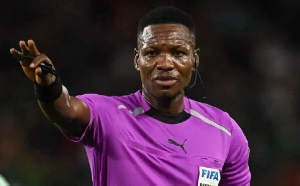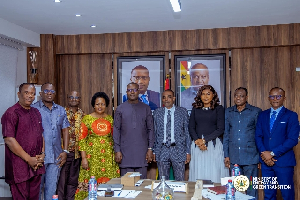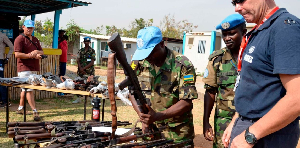Politics of Thursday, 22 June 2006
Source: GNA
Nkrumaists parties are deficient in organizational ability - Dumor
Accra, June 22, GNA - Professor Ernest Dumor, a Former Commissioner of the Electoral Commission (EC), on Thursday said Election 2004 revealed the organizational competence of the ruling New Patriotic Party (NPP) and the main opposition National Democratic Congress (NDC). "It also exposed organizational deficiencies of the Nkrumaist parties - People's National Convention (PNC) and the Convention People's Party (CPP) and the ineptitude of its leadership," Prof. Dumor stated during a review in Accra of the book; "Voting for Democracy in Ghana: The 2004 Elections in Perspective - Volumes One and Volume Two" in Accra.
The Book is authored by Professor Kwame Boafo-Arthur, Head of Political Science Department of the University of Ghana. Prof. Dumor, who is the Executive Secretary of the National Identification Authority (NIA), attributed the CPP's demise to the dynamics of political dismemberment of its structures under the National Liberation Council; the fractious state of Imoro Egala and Dr Hilla Limann's People's National Party (PNP) and the further dislocation the Nkrumaist Tradition suffered under the Provisional National Defence Council (PNDC) and its incorporation into NDC.
"The incorporation was nearly complete because the populist inclination of Former President Jerry John Rawlings was close to the socialist views of the CPP remnants."
Prof Samuel N. Woode, Chairman of the Public Services Commission, who chaired the launch, said the adoption of the 1992 Constitution was an affirmation of the nation's stand on democracy and rejection of military rule.
"When in 1992 we adopted the Constitution, we were indeed voting for democracy that we should continue voting for democracy and that in between elections we will respect the democratic imperatives of governance."
Prof. Woode said the Book would increase knowledge about the practice of democracy in Ghana 96 93our knowledge about elections is expanding and we are seeing the ways in which electioneering is being transformed in this country=94.
The book focuses on an overview of the 2004 General Elections, institutional development and democratic consolidation, political leadership and democratic consolidation, political parties and electoral competition in Ghana, and the quest for national reconciliation in Ghana: Challenges and Prospects.
Volume Two focuses on Elections 2004 and politics in Upper West Akim and New Juabeng South Constituencies; the 2004 Elections in four constituencies - Bolgatanga Central; Bongo; Gomoa West and Komend-Edina-Eguafo-Abirem - understanding Ghana's democratic development in the context of the 2004 Elections in Ledzokuku and Ashaiman constituencies and political participation; democratic consolidation and elections in Ghana; and the case of the Akan, Anlo and Keta constituencies in the Volta region.












